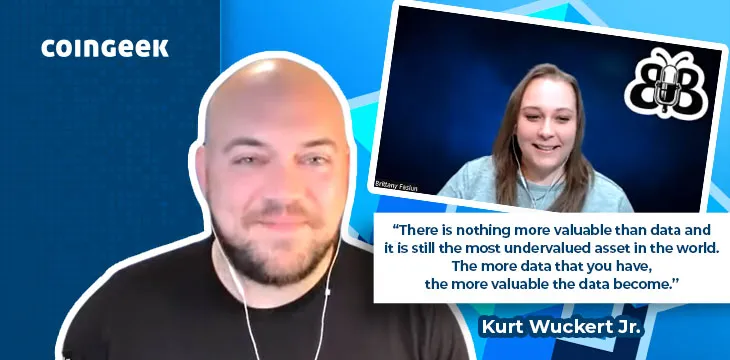|
Getting your Trinity Audio player ready...
|
Kurt Wuckert Jr. joined the Brittany Bitz podcast to talk about recent events in Bitcoin SV (BSV), mining, node software, the empty block miner, and the Bitcoin Citadel in Florida.
The Lopp list
Brittany Faslun begins by asking for Wuckert’s thoughts on Jameson Lopp’s recent BSV block list. He published a list of BSV accounts on social media to enable anyone to quickly block everyone and drown out the narrative about big block Bitcoin.
Wuckert describes it as “juvenile,” but at the same time, he recognizes that Lopp isn’t just a nobody—he does have influence. While the tool itself might not be super effective, Wuckert says it’s just another sign of nastiness, and putting names on a list like that and releasing it to everyone could be dangerous.
Pointing out the insanity of the situation, Wuckert notes that all Lopp really disagrees with him and other BSVers about is how much bandwidth is appropriate on a network. Somehow, that has spiraled into a turf war and all of the associated nonsense.
“The list is just one more stupid thing in a stupid war involving stupid people,” he says.
BSV node software and mining on BSV
Wuckert talks a little about the different camps in BSV and some of the voices trying to pull things in different directions. He points out that there are some valid criticisms of the node software that deserve to be heard.
What Wuckert has learned is that there are no experts when it comes to this stuff. It’s extremely difficult, and that’s why nChain is doing most of the research and development. That’s helpful in a way, but it is also a worry, in Wukcert’s view, given that nChain has 300+ employees and very few people know who they are.
Staying on the topic of mining, Wuckert says he was very impressed with Mempool and Matterpool back in the day. They were breaking all the records and setting records, whereas TAAL (CSE: TAAL | FWB:9SQ1 | OTC: TAALF) was a much slower-moving, conservative entity. Wuckert decided to jump into the game with GorillaPool to find out for himself what path is right. As of now, GorillaPool has 12 petahash and has had up to 30 at times. That’s about 5% of the network on a good day.
Wuckert then explains how GorillaPool submerges its mining rigs in mineral oil. This pulls heat away from them more efficiently and helps keep the rigs cool. This makes the mining process more efficient and can push the limits of the rigs quite a bit further. Naturally, this speeds up the ROI time, too.
The empty block miner
Addressing the empty block miner, Faslun says she feels this has given people a rude awakening and made them realize what could potentially happen. However, there are some very obvious issues with exchanges freezing BSV deposits and withdrawals. She asks for Wuckert’s opinion on this.
Wuckert says he hasn’t made up his mind yet about whether it’s bullish or bearish. He notes that there are many rumors and speculation about what’s going on, but ultimately, nobody knows.
What about the fees? Should they be higher right now? Faslun asks. Wuckert says there’s no hard answer. That’s just the nature of economics, and things are constantly changing. As a miner, he won’t take on exponential risk for lower and lower fees, so there has to be a balance between everyone’s interests.
“Mining is always more or less breakeven,” Wuckert says, explaining that there are many ways to make money from data. He agrees with Meta (NASDAQ: META) CEO Mark Zuckerberg that data is money and says the number of ways to make money from it is “unfathomable.” There has even been discussion among some clued-in BSVers about making transactions free or even paying big companies to put their data on the ledger for this reason.
The Bitcoin Citadel in South Florida
Wuckert explains that he attended a couple of meetings at the Chicago Hack House. This led to having some plans of his own along with some friends. Eventually, they found a spot of about 2,000 sq/ft and converted it into a space, including a studio and a pit for 40-50 people to work.
“Everyone is welcome,” Wuckert says, joking that he might not allow Blockstream to set up in the corner, but basically anyone else can come and work there. In the long run, he wants everyone involved in BSV in the world to feel they have a place to be.
Given that BTC Core trolls recently attacked Wuckert after the Granath vs. Wright trial, Faslun asks if he has any security concerns related to being in a singular location like this. Wuckert says he isn’t afraid of anyone and knows how to defend himself. He does worry about things like identity theft.
“I’m not going to stop living my life,” he says.
Signing off, Wuckert says there’s a lot of re-tooling coming up. There’s much work to be done, and he plans to be part of helping complete it.
Watch: The BSV Global Blockchain Convention presentation, Making it easy for creators to earn – using BSV blockchain

 07-04-2025
07-04-2025 





